
Innoeduca-International Journal of Technology and Educational Innovation
Scope & Guideline
Empowering Education Through Innovative Technology
Introduction
Aims and Scopes
- Integration of Technology in Education:
The journal aims to investigate how various technologies can be integrated into educational settings to improve teaching and learning outcomes. - Pedagogical Innovations:
It focuses on new teaching methodologies and pedagogical frameworks that leverage technology to foster student engagement and learning. - Assessment and Evaluation Techniques:
The journal explores innovative assessment strategies, particularly those that utilize digital platforms, to ensure fairness and reliability in educational evaluations. - Learner-Centered Approaches:
A consistent emphasis on understanding student experiences, preferences, and engagement with technology in learning environments. - Research on Digital Competence:
The journal highlights studies that contribute to understanding the digital competencies required for both educators and students in the modern educational landscape.
Trending and Emerging
- Online and Blended Learning:
An increasing number of studies focus on online and blended learning environments, especially in the context of the COVID-19 pandemic, emphasizing the importance of adaptability in education. - Mobile Learning and Accessibility:
There is a growing interest in mobile learning solutions and their acceptance among students, highlighting the need for accessible educational technologies. - Digital Assessment Tools:
The use of digital assessment methods is gaining prominence, reflecting a trend towards more innovative and reliable evaluation techniques in education. - Social Media and Learning Engagement:
Research on the role of social media in education is emerging, indicating its potential to enhance student engagement and collaborative learning. - Gamification and Game-Based Learning:
A notable trend towards gamification and game-based learning approaches is evident, showcasing their effectiveness in improving motivation and learning outcomes.
Declining or Waning
- Traditional Educational Methods:
There is a noticeable decrease in papers discussing conventional teaching methods without the integration of technology, suggesting a shift towards more innovative and tech-enhanced approaches. - Generalized Digital Literacy:
Papers that address basic digital literacy skills are becoming less common, as the focus shifts to more specific competencies and advanced digital skills required for modern education. - Static Learning Environments:
Research focusing solely on traditional, non-interactive learning environments is waning, with increasing emphasis on dynamic, digital, and blended learning contexts. - Non-Interactive Educational Tools:
The prevalence of studies centered around non-interactive educational tools is declining, as there is a growing preference for interactive and engaging technologies.
Similar Journals

Journal of Baltic Science Education
Transforming Science Learning Through Collaborative ResearchThe Journal of Baltic Science Education, with ISSN 1648-3898, is a leading academic journal published by the SCI METHODICAL CENTRE - SCI EDUCOLOGICA in Lithuania. This esteemed journal, established in 2008, has gained recognition within the educational sector, boasting a notable impact factor that places it in the Q2 category for the year 2023, highlighting its significance in advancing educational research. With Scopus rankings reflecting a commendable placement at #659 out of 1543 in the Education category, the journal serves as a vital platform for disseminating knowledge and fostering discourse among researchers, professionals, and students in the field of science education across the Baltic region and beyond. The journal’s objectives include promoting innovative educational practices, sharing empirical research findings, and contributing to the development of effective science teaching methodologies, ensuring that it remains at the forefront of academic inquiry in education.

Etic net-Revista Cientifica Electronica de Educacion y Comunicacion en la Sociedad del Conocimiento
Innovating Education for a Knowledge-Driven SocietyEtic net-Revista Cientifica Electronica de Educacion y Comunicacion en la Sociedad del Conocimiento, published by UNIV GRANADA, is a pioneering open-access journal dedicated to the exploration and dissemination of research in the fields of education and communication within the context of knowledge society. Since its inception in 2002, this journal has provided a platform for scholars, researchers, and practitioners to share innovative ideas and empirical studies, fostering critical dialogue and collaboration in the rapidly evolving landscape of digital education and communication. With its ISSN 1695-324X, Etic net aims to bridge theoretical frameworks and practical applications, contributing significantly to the scholarly discourse and practices that shape contemporary educational experiences globally. Through its commitment to open access, the journal ensures that high-quality research is freely available to all, promoting inclusivity and accessibility in academic publishing. We invite you to explore the latest findings and contribute to shaping the future of education and communication by engaging with this essential resource.

Problems of Education in the 21st Century
Innovating Solutions for Today's Educational Issues.Problems of Education in the 21st Century is a pivotal academic journal published by SCIENTIA SOCIALIS, focusing on the ever-evolving challenges and opportunities in the field of education. With its ISSN 1822-7864 and E-ISSN 2538-7111, the journal serves as an essential resource for researchers, educators, and policy makers interested in exploring contemporary educational issues, innovations, and practices. Although currently not indexed in Scopus, the journal has previously covered contributions between 2017 and 2019, providing a platform for critical dialogue in the field. Based in Lithuania, it emphasizes an open-access approach, fostering wide dissemination of research that informs educational advancements. With a Scopus rank in the 20th percentile within the Social Sciences and Education category, the journal invites contributions that examine significant topics impacting education today, ensuring a broad spectrum of scholarly discussion aimed at enhancing teaching and learning experiences in the 21st century.
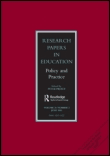
Research Papers in Education
Transforming educational discourse through high-quality research.Research Papers in Education is a leading academic journal dedicated to advancing the field of education through the dissemination of high-quality research. Published by ROUTLEDGE JOURNALS, TAYLOR & FRANCIS LTD, this journal, with an ISSN of 0267-1522 and E-ISSN 1470-1146, has been pivotal in shaping educational discourse since its inception in 1986. The journal is recognized in the Q1 quartile for Education in the 2023 rankings and boasts an impressive 91st percentile in Scopus rankings. While it operates under a traditional subscription model, its reach is enhanced by its commitment to scholarly rigor, making it an indispensable resource for researchers, professionals, and students alike. Covering a diverse range of topics including pedagogical strategies, policy analysis, and educational technology, Research Papers in Education facilitates critical dialogue and innovation in the educational landscape, contributing significantly to the ongoing conversation around effective teaching and learning practices.
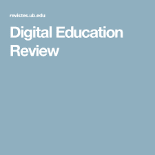
Digital Education Review
Empowering Learning with Cutting-Edge ResearchDigital Education Review, published by the University of Barcelona, stands at the forefront of the Digital and Educational Technology field, offering a valuable platform for researchers, educators, and policymakers since its inception as an Open Access journal in 2010. With an emphasis on innovative practices and critical evaluations in digital education, the journal has garnered an impressive standing within the academic community, achieving rankings of Q3 in Computer Science Applications and Q2 in Education for 2023, alongside a notable position in the 71st percentile of Social Sciences - Education rank (447 out of 1543). The journal aims to foster interdisciplinary dialogue and disseminate research that influences educational transformation through digital means. Based in Spain, the Digital Education Review not only promotes high-quality research but also engages with a global audience, making it a pivotal resource for those dedicated to advancing the understanding of digital educational practices.
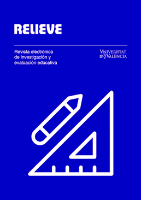
RELIEVE-Revista Electronica de Investigacion y Evaluacion Educativa
Empowering educators with cutting-edge evaluation insights.RELIEVE-Revista Electronica de Investigacion y Evaluacion Educativa is a leading open-access journal dedicated to advancing research and evaluation in the field of education. Published by the ASOC INTERUNIVERSITARIA INVESTIGACION PEDAGOGICA in Spain, this esteemed journal, with an ISSN of 1134-4032, has been a pivotal platform for scholarly discourse since its inception in 1995. As of 2023, it is ranked in the Q2 Quartile for Education within Scopus, reflecting its significant impact in the academic community, where it occupies the 61st percentile among 1543 journals in the Social Sciences Education category. Spanning the years 2001 to 2024, RELIEVE covers a broad scope of topics within educational research and evaluation, making it an invaluable resource for educators, researchers, and policy makers alike. With its commitment to open access, the journal ensures that critical educational research is freely available to inspire innovation and improvement in educational practices across the globe.
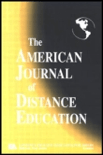
American Journal of Distance Education
Pioneering research for a new era of online education.The American Journal of Distance Education, published by ROUTLEDGE JOURNALS, TAYLOR & FRANCIS LTD, stands as a premier publication in the field of online learning and distance education. With an ISSN of 0892-3647 and an E-ISSN of 1538-9286, this journal has been at the forefront of research since its inception in 1987, delivering insights into emerging trends and methodologies in educational technology. Nestled in the United States, it enjoys a commendable reputation with an impact factor that reflects its significance, as indicated by its category quartiles: Q2 in Computer Science Applications and Q1 in Education, along with impressive Scopus rankings placing it in the top percentiles of its categories. The journal's mission is to foster scholarly discourse and present empirical research that addresses the challenges and innovations in distance learning environments. Researchers, educators, and students alike will find valuable information that contributes to the advancement of this rapidly evolving field.
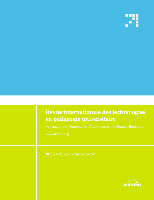
International Journal of Technologies in Higher Education
Transforming Education Through TechnologyInternational Journal of Technologies in Higher Education, with ISSN 1708-7570 and E-ISSN 1708-7570, is a distinguished academic platform dedicated to advancing the intersection of technology and pedagogy in higher education. Published by INT JOURNAL TECHNOLOGIES HIGHER EDUCATION, this open-access journal has been at the forefront of educational innovation since 2004, providing researchers, practitioners, and students access to high-quality research without financial barriers. The journal aims to disseminate cutting-edge studies, best practices, and theoretical insights that explore the transformative impact of emerging technologies in the field of education. Situated in Montreal, Canada, the journal serves as a pivotal resource for those committed to enhancing learning environments through technological advancements. By fostering scholarly discussion and collaboration, the International Journal of Technologies in Higher Education plays an essential role in shaping the future of educational practices globally.

INTERNATIONAL JOURNAL OF TECHNOLOGY AND DESIGN EDUCATION
Empowering Educators with Cutting-Edge InsightsINTERNATIONAL JOURNAL OF TECHNOLOGY AND DESIGN EDUCATION is a premier academic journal published by Springer, dedicated to advancing the field of educational technology and design. With an impressive impact factor and an established presence since 1990, this journal serves as a vital platform for researchers, educators, and practitioners who strive to bridge the gap between technological advancements and design methodologies in various educational contexts. It is renowned within its scope, holding a Q1 ranking in both Education and Engineering categories as of 2023, reflecting its significant contribution to the scholarly community. The journal is indexed by Scopus, ranking #250 out of 1543 in Social Sciences - Education and #64 out of 307 in Engineering, which situates it comfortably within the top percentile of both fields. Although it does not offer open access, this journal continues to provide essential insights and cutting-edge research that informs best practices in technology and design education, making it indispensable for professionals and academics dedicated to fostering innovative educational experiences.

International Journal of Technology in Education
Fostering Knowledge and Innovation in Educational TechnologyThe International Journal of Technology in Education, published by the International Society for Technology Education & Science (ISTES), serves as a vital platform for researchers, educators, and practitioners devoted to the intersection of technology and educational practices. With an E-ISSN of 2689-2758, this journal aims to showcase innovative research, case studies, and theoretical contributions that explore how emerging technologies can enhance teaching and learning. Although specific metrics like impact factor and HIndex are currently unavailable, the journal is committed to rigorous peer review and high academic standards, ensuring that all published work contributes meaningfully to the evolving landscape of educational technology. As an open-access journal, it strives to make research widely available, fostering collaboration and knowledge sharing among its audience. Whether you are a researcher exploring new horizons or a professional seeking practical applications of technology in education, the International Journal of Technology in Education is an indispensable resource.